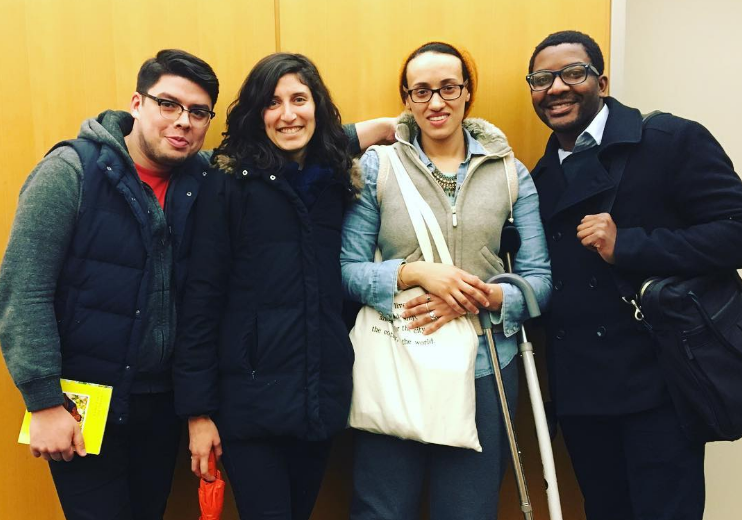
The TRAUE Special Issue Editors, from left to right: José Alfredo Menjivar, Sara Vogel, Sakina Laksimi-Morrow, Robert Robinson
#BlackLivesMatter is this generation’s social justice call-to-action, and was founded by three queer women of color. This piece of herstory is foundational to always assert as a caution and a reminder of how history often gets co-opted and whitewashed. #BlackLivesMatter articulates the narratives and counter-narratives of Black people, blackness in the United States, and the way that these resonate across the exceedingly blurry lines of race, ethnicity, gender, sexuality and class. We believe that Black lives matter–in our schools, in our communities, and in the academy. #BlackLivesMatter: not just in theory but also in praxis. That is the theme of this TRAUE issue. As an organizing cornerstone, #BLM inspires us to consider a variety of topics around racial and social justice in the midst of racialized militaristic presence of officers who exercise unwritten state-sponsored violence, and these precarious political times.
The four editors of this issue came together with a common imperative: to expand, even explode, what an academic journal looks like, and redefine its function and purpose. In keeping with the spirit of #BLM’s focus on equitable processes and intersectionality, as we embarked on this journey, we asked ourselves: Who traditionally gets published in the academy, and why? Who does not, and what voices get left out, and why? What forms of writing are valued and get published, and which do not? What would it look like to bring a critical lens to not just the content of a student-run journal, but the process of publishing it?
To honor the mission of bringing a critical diversity to the issue, it was crucial to consider the way our call for pieces and our engagement with contributors allowed for flexibility, fluidity and openness. We sought to elicit the voices of people who think deeply about how Black lives matter in education. While we had aimed to include contributors from CUNY and beyond, most of our contributors are affiliated with our institution. Nevertheless, the diversity of genres and perspectives capture voices of educators, students, scholars and artists. They interrogate and reflect on the experiences of race and racism in educational settings. They celebrate educators’, students’, and community activists’ engagement with identity, internal conflicts, interactions, and everyday lived experiences across the lines of race, class, gender, and geography. Resistance and knowledge take many forms that spring from many sources, and for this, the issue is multi-textual, bringing into conversations pieces from across different genres and mediums.
In these times, we hope this issue extends our collective commitment to ensure #BlackLivesMatter in public education and in the academy. Parents, teachers, students, teacher educators, administrators, and community members must all remember how much we need each other in this dire political moment. Our social, economic, and political future is tied to the holistic growth of our current generation of students, and we must plan and act with this reality ever in our consciousness. With this issue, we hope our readers consider how they will renew their commitments to liberatory education and purposeful organization. We recommit to meaningful dialogue across our respective spheres of influence, and to co-constructing educational experiences that ensure critical thinking, empathy, and shared learning for students, educators, and communities. We recommit to a pedagogy of love and respect that yields a seamless thread between theory and practice.
We hope you find this issue as inspiring and enlightening as we do.
–Robert, Sakina, José Alfredo, and Sara

